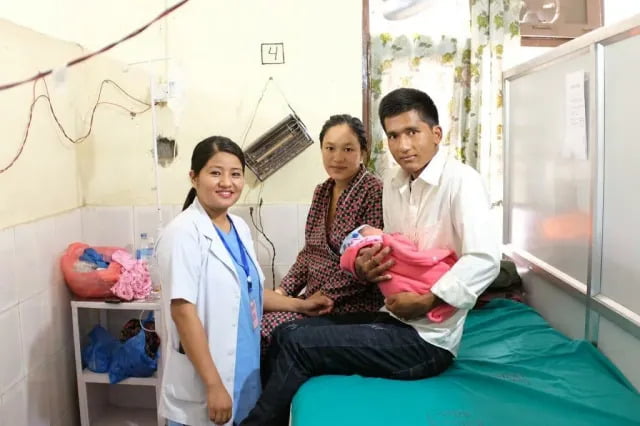The Surrogacy Process in Nepal is a beacon of hope for those yearning for parenthood. With a welcoming legal framework, skilled medical professionals, and cost-effective options, Nepal has become a favored destination for surrogacy. This guide takes you through the nuances of surrogacy in this Himalayan nation, covering the legitimate scene, operations, profound contemplations, and financial aspects. Whether you’re a hopeful parent or just investigating this excursion, this guide gives important experiences into surrogacy in Nepal.

Understanding Surrogacy
Surrogacy is a process where a woman, known as a surrogate or gestational carrier, becomes pregnant and carries a child for another individual or couple. This method of family-building is often chosen by those who cannot conceive and carry a pregnancy to term on their own due to medical reasons or other circumstances.
There are two primary types of surrogacy:
- Traditional Surrogacy: In traditional surrogacy, the surrogate uses her own egg and is artificially inseminated with the intended father’s sperm or donor sperm. This means that the surrogate is genetically related to the child.
- Gestational Surrogacy: In gestational surrogacy, the surrogate carries a child conceived through in vitro fertilization (IVF). The intended parents’ egg and sperm or donor gametes are used to create the embryo, which is then transferred to the surrogate’s uterus. The surrogate is not genetically related to the child in this case.
The surrogacy process typically involves several key steps:
- Selection of a Surrogate: Intended parents may choose a surrogate known to them, such as a friend or family member, or they can work with a surrogacy agency to find a suitable match.
- Medical and Psychological Screening: Surrogates and intended parents undergo thorough medical and psychological assessments to ensure their suitability for the process.
- Legal Agreements: A surrogacy agreement is drafted, outlining the roles and responsibilities of all parties involved. This agreement is signed by the intended parents, the surrogate, and sometimes the surrogate’s spouse or partner.
- Fertility Treatments: In the case of gestational surrogacy, fertility treatments, such as IVF, are performed to create an embryo using the intended parents’ genetic material or donor gametes. This embryo is then transferred to the surrogate’s uterus.
- Pregnancy and Medical Care: The surrogate becomes pregnant and receives regular medical care and monitoring throughout the pregnancy.
- Birth and Parental Rights: After the child is born, legal methods are started to move parental freedoms from the surrogate to the planned guardians. This might include court requests and birth declaration corrections.
Surrogacy is a complex and genuinely charged interaction, and it is fundamental for all gatherings required to keep up with transparent correspondence all through the excursion. It is frequently prescribed to look for legal and counseling services to explore the lawful and profound parts of surrogacy.
The lawfulness and guidelines encompassing surrogacy change from one country to another and, surprisingly, inside various states or districts. It’s urgent to be very much informed about the legitimate and moral parts of surrogacy in your particular area to guarantee a smooth and legally secure process.
Surrogacy can be a lovely way for people or couples to satisfy their dream about becoming guardians, yet it isn’t without its difficulties and contemplations. Understanding the interaction and approaching the right assets and backing can make the excursion more sensible and satisfying for all interested parties.

Success Rates, Legal Framework and Factors Affecting Surrogacy Process in Nepal
The surrogacy process in Nepal holds the promise of parenthood for many individuals and couples facing infertility challenges. However, understanding the factors that influence the success of surrogacy and the nuances specific to Nepal is essential. In this article, we will delve into the success rates of surrogacy in Nepal and the key factors that play a pivotal role in the journey to achieving the dream of parenthood. By exploring these elements, prospective parents can make informed decisions and enhance their chances of a successful surrogacy experience in Nepal.
Success Rates
Success rates in surrogacy are a critical consideration for intended parents. In Nepal, success rates can vary from one surrogacy clinic to another. The average success rate for surrogacy in Nepal typically ranges from 40% to 60%. These rates can be influenced by several factors, including the age and health of the surrogate mother, the nature of the gametes utilized (eggs and sperm), and the experience of the Medical group included. It’s vital to take note of that success rates can likewise be impacted by individual conditions, like the underlying causes of infertility.
Factors Affecting Surrogacy Success
Several factors can significantly impact the success of the surrogacy process in Nepal:
- Medical Assessment: The thorough medical evaluation of both the expected guardians and the surrogate mother is critical. Any hidden ailments or medical problems can influence the progress of the pregnancy.
- Surrogate Selection: The health and appropriateness of the surrogate mother are crucial. Substitutes ought to have a demonstrated record of effective pregnancies and be in great health.
- Egg and Sperm Quality: The nature of the gametes utilized in the IVF process is essential. Assuming either the expected mother’s eggs or the planned dad’s sperm have quality issues, this can influence the outcome of treatment and pregnancy.
- Embryo Transfer: The process of transferring the embryo into the surrogate’s uterus requires accuracy and mastery. The experience of the clinical group playing out the exchange can influence the progress of the method.
- Legal Framework: Guaranteeing that all legitimate perspectives are accurately overseen is essential. A very much drafted surrogacy understanding and legitimate documentation are fundamental for a successful surrogacy process.
- Psychological Support: Emotional well-being is vital for both the planned guardians and the surrogate mother. Sufficient basic reassurance and directing can assist with overseeing pressure and nervousness, adding to a more effective surrogacy journey.
- Communication and Trust: Clear and open communication between all gatherings included, including the planned guardians, the substitute, and the medical group, cultivates trust and understanding, which is vital to a successful surrogacy experience.
Legal Framework in Surrogacy Nepal
Surrogacy in Nepal is governed by a relatively supportive legal framework. It permits surrogacy for heterosexual couples with documented medical infertility, while same-sex couples and single individuals are not eligible. The intended parents must provide evidence of their inability to carry a pregnancy to term. Surrogacy agreements are legally binding and safeguard the rights and responsibilities of all parties involved, ultimately allowing for the transfer of parental rights from the surrogate to the intended parents once the child is born.

Costs and Financial Considerations
One of the significant factors that prospective parents must carefully consider when embarking on the surrogacy process in Nepal is the associated costs. Surrogacy is an investment in the dream of parenthood, and while Nepal often offers more affordable options compared to many Western countries, it’s essential to plan and budget for the various expenses involved.
Medical Expenses
The medical expenses associated with surrogacy in Nepal can vary depending on the clinic and the specific procedures required. These expenses typically include the costs of in-vitro fertilization (IVF), pre-implantation genetic testing (PGT), embryo transfer, medical assessments, prenatal care, and childbirth. It’s crucial to have a clear understanding of the clinic’s fee structure and any additional medical costs that may arise during the surrogacy journey.
Legal Fees
Navigating the legal aspects of surrogacy is a critical part of the process. Legal fees encompass drafting the surrogacy agreement, obtaining consent forms, processing parental rights, and other legal documentation. The cost of legal services may vary depending on the complexity of the case and the legal professionals involved.
Surrogate Compensation
Compensating the surrogate mother is a significant financial consideration. Surrogates in Nepal are typically paid a fee for their services, which can vary depending on the agreement and the clinic. It’s essential to factor in this compensation when budgeting for the surrogacy journey. Some clinics may also cover the surrogate’s medical and living expenses.
Administrative and Miscellaneous Costs
In addition to medical, legal, and surrogate-related expenses, there may be administrative and miscellaneous costs. These could include travel expenses, accommodation, translation services if you are an international intended parent, and any unforeseen expenses that might arise during the process.
Childbirth and Post-Birth Expenses
Childbirth and post-birth expenses ought to likewise be thought of. These costs might incorporate emergency hospital bills, medical care for the infant, and different expenses related with bringing the child home. Appropriate monetary arranging is essential to guarantee that there are no unforeseen monetary weights after the kid’s introduction to the world.
Future Financial Considerations
While zeroing in on the prompt costs of surrogacy, planned guardians ought to likewise ponder future financial considerations. Bringing up a kid includes continuous costs like childcare, training, medical care, and other everyday requirements. It’s wise to spending plan for these drawn out monetary obligations to guarantee the child’s prosperity and future.

Emotional Support and Counselling During the Surrogacy Journey
Bringing a child into the world through surrogacy is a profound and life-changing experience. It’s a journey filled with hope, joy, and excitement, but it can also be emotionally challenging for all parties involved—intended parents, surrogate mothers, and the families surrounding them. Emotional support and counseling play a pivotal role in ensuring that this journey is as smooth and positive as possible.
For Intended Parents
- Hope and Anticipation: Intended parents often embark on the surrogacy journey after years of struggling with infertility. The anticipation and hope that this journey brings can be overwhelming. Counseling helps them manage their expectations and cope with the emotional ups and downs.
- Managing Anxiety: The process of finding the right surrogate, going through medical procedures, and waiting for the birth of the child can be anxiety-inducing. Counseling provides strategies to manage these anxieties and maintain emotional well-being.
- Understanding Grief: Surrogacy may involve letting go of the idea of a traditional pregnancy. Counseling can help intended parents process any grief or loss associated with not carrying the child themselves.
For Surrogate Mothers
- Emotional Challenges: Surrogate mothers undergo both physical and emotional changes during the pregnancy. They may experience attachment to the baby, concerns about relinquishing the child, or judgments from others. Emotional support helps them navigate these challenges.
- Empowerment: Counseling empowers surrogate mothers to make informed decisions and provides them with a supportive space to express their feelings and concerns without judgment.
- Coping with Relationships: Surrogate mothers may face challenges within their own families or communities. Counseling equips them with tools to explain their decision and manage relationships effectively.
For Families and Friends
- Understanding and Support: Family and friends of intended parents and surrogate mothers play an essential role. Counseling can help them understand the unique dynamics of surrogacy and provide the right kind of support and empathy.
- Handling Difficult Conversations: Counselors can facilitate open and honest conversations within families and among friends to address concerns, questions, and misconceptions.
The Benefits of Emotional Support and Counseling
- Enhanced Mental Health: Emotional support and counseling can diminish pressure, uneasiness, and melancholy for all gatherings included, advancing generally mental prosperity.
- Improved Communication: Compelling openness is of the utmost importance in surrogacy. Directing improves relational abilities, guaranteeing that everybody is in total agreement.
- Conflict Resolution: In case of debates or conflicts, advisors can intercede and help with finding goals that are to the greatest advantage of the child.
- Post-Birth Support: Emotional support doesn’t end with the introduction of the child. Guides can help in dealing with the personal difficulties that might emerge post-birth.
The surrogacy journey is a demonstration of the flexibility of the human soul and the unlimited limit with regards to cherish. Daily reassurance and directing are the points of support that guarantee a positive encounter for all included. By giving direction, a place of refuge for articulation, and strategies to explore the close to home viewpoints, the surrogacy journey turns into a groundbreaking and engaging experience for everybody on this staggering way to being a parent.
Why Choose Surrogacy in Nepal?
Choosing surrogacy in Nepal can be a compelling option for several reasons:
- Supportive Legal Framework: Nepal’s legal framework for surrogacy is relatively supportive. Unlike many countries, it does not prohibit surrogacy for foreign nationals. This makes it accessible to international intended parents.
- Affordability: Surrogacy in Nepal is often more affordable compared to many Western countries. The costs, including medical expenses, legal fees, and surrogate compensation, are relatively reasonable, making it an attractive option for those with budget constraints.
- Experienced Medical Professionals: Nepal has experienced and skilled healthcare professionals in the field of assisted reproduction. These experts provide quality medical care and guidance throughout the surrogacy journey.
- Accessibility for Foreign Nationals: Nepal allows foreign nationals to participate in surrogacy arrangements. This accessibility can be particularly beneficial for international intended parents who may face restrictions in their home countries.
- Established Surrogacy Clinics: Nepal has laid out surrogacy facilities that have some expertise in giving surrogacy services. These centers frequently have a history of fruitful surrogacy game plans and experienced staff.
- Transparent Process: The surrogacy process in Nepal typically involves transparent and straightforward legal procedures. Surrogacy agreements and other documentation are well-defined, providing clarity and legal protection for all parties involved.
- Emotional Support: Many surrogacy clinics in Nepal offer advising and daily reassurance administrations to assist expected guardians and surrogate mothers with exploring the close to home parts of the surrogacy venture. This help can be significant during the interaction.
- Availability of Surrogate Mothers: Nepal for the most part has a pool of willing and qualified surrogate moms, which can work with the matching system and facilitate the surrogacy journey.
- Cultural Affinity: For expected guardians from adjoining nations or districts, Nepal might offer a social liking that can make the surrogacy interaction more agreeable and interesting.

Conclusion
The Surrogacy Process in Nepal offers the promise of new beginnings and the fulfillment of cherished dreams. With its supportive legal regulations, dedicated healthcare professionals, and affordability, Nepal has emerged as a sanctuary for surrogacy. By understanding the legal nuances, making informed choices, offering emotional support, and managing the financial aspects, individuals and couples can embark on their surrogacy journey in Nepal with hope and determination, taking significant steps toward the joy of parenthood.
IMPORTANT NOTICE: “SURROGACY IS NOT LEGAL IN NEPAL”
Frequently Asked Questions (FAQs)
1. Is surrogacy legal in Nepal for foreign nationals?
Yes, surrogacy is legal for foreign nationals in Nepal. The country has a relatively supportive legal framework that allows surrogacy arrangements, provided certain conditions and regulations are met.
2. Who is eligible to pursue surrogacy in Nepal?
Heterosexual couples with a medical need for surrogacy are typically eligible. Same-sex couples and single individuals are generally not eligible for surrogacy services in Nepal.
3. What are the steps involved in the surrogacy process in Nepal?
The surrogacy process involves medical assessments, selecting a surrogacy clinic, IVF procedures, legal documentation, and emotional considerations. It is essential to have thorough medical assessments, legal documentation, and emotional support throughout the process.
4. What is the role of a surrogacy agreement in Nepal?
A surrogacy agreement is a legally binding document that outlines the roles and responsibilities of all parties involved, including the intended parents and the surrogate. It serves as a crucial aspect of the surrogacy process, ensuring clarity and consent.
5. What are the costs associated with surrogacy in Nepal?
Surrogacy costs can vary, including medical expenses, legal fees, surrogate compensation, and other related expenses. Prospective parents should budget for these costs and consider the financial implications of raising a child.
6. How is parental rights transferred in the surrogacy process in Nepal?
After the child’s birth, legal proceedings are initiated to transfer parental rights from the surrogate mother to the intended parents. This involves legal documentation and a court process to establish the child’s parentage.
Read Also:

